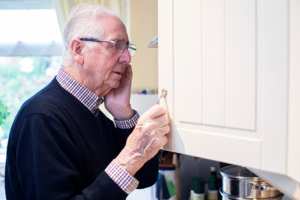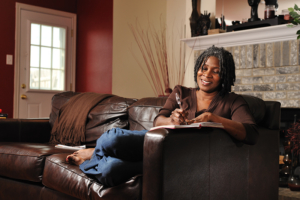What to Do When A Senior with Dementia Refuses to Change Clothes

Learn gentle dementia care tips for difficult situations.
Caring for someone with Alzheimer’s disease or another form of dementia requires creativity, patience, and empathy, the ability to step outside of your individual reasoning and logic and understand why a certain behavior is occurring, and then to know the best way to successfully manage it. That is certainly the case when an older adult with dementia refuses to change clothes, in spite of how unkempt or dirty an outfit has become.
There are lots of reasons why an individual with Alzheimer’s disease may insist on wearing exactly the same outfit, including:
- Judgment or memory problems, for example, losing track of time or thinking the clothes were recently changed
- The comfort and familiarity of a particular piece of clothing
- A desire to maintain control
- Difficulty with the task of changing clothes
- Feeling stressed by the choices related to selecting an outfit
- Physical pain and/or fatigue
- The inability to detect scent or even to clearly see stains on clothes
Our Alzheimer’s care team has some strategies to assist:
- Most importantly, never argue or attempt to reason with someone with dementia.
- Purchase extra outfits that are identical to the one your loved one insists on wearing.
- When the senior loved one is bathing or asleep, take away the dirty clothing from the room and replace with clean items.
- Make getting dressed as easy as possible, with just a couple of choices which are simple to put on and take off, and allowing as much time as needed for dressing.
- Offer clothing options in solid colors in lieu of patterns that could be confusing, distracting, or visually overstimulating.
- Take into consideration any timing issues: Is the senior loved one extremely tired and/or agitated at a particular time of day? If so, try incorporating dressing into the time of day when he or she typically feels the most content and calm.
- Establish if your own feelings are exacerbating the matter in the slightest. For instance, is it a question of embarrassment that is driving the demand for your senior loved one to dress in a certain way?
Keep in mind that wearing a comfy outfit for an added day may be preferred as opposed to the emotional battle involved with forcing a change of clothing. When it truly becomes an issue however, give us a call! Sometimes, a loved one feels more at ease being assisted with personal care needs such as dressing and bathing by a skilled in-home caregiver rather than a family member. Responsive Home Care’s experts are experienced and skilled in helping those with Alzheimer’s disease maintain personal hygiene with kindness and compassion, and they are always available to help.
Give us a call at 954-486-6440 for additional helpful tips or to arrange an in-home consultation for dementia in-home care in Plantation and the surrounding areas.

 Awkwardness. Discomfort. Disbelief. Shame. Each one of these feelings can cycle through a family caregiver’s heart when someone you care about with
Awkwardness. Discomfort. Disbelief. Shame. Each one of these feelings can cycle through a family caregiver’s heart when someone you care about with  The COVID-19 pandemic put the world on pause, including, among a great many other activities, healthcare appointments and procedures. In fact, nearly 50% of all adults either canceled or delayed routine health care and elective treatments since the coronavirus crisis began, leading medical professionals to become concerned about the consequences.
The COVID-19 pandemic put the world on pause, including, among a great many other activities, healthcare appointments and procedures. In fact, nearly 50% of all adults either canceled or delayed routine health care and elective treatments since the coronavirus crisis began, leading medical professionals to become concerned about the consequences.




 Taking care of a senior loved one with Alzheimer’s is a fluid, ever-evolving undertaking. One day may be calm and peaceful, with your parent enjoying activities, eating healthy meals, and sharing laughter with you; while the next day may be filled with agitation, anxiety, and sullenness. Exactly what will today bring?
Taking care of a senior loved one with Alzheimer’s is a fluid, ever-evolving undertaking. One day may be calm and peaceful, with your parent enjoying activities, eating healthy meals, and sharing laughter with you; while the next day may be filled with agitation, anxiety, and sullenness. Exactly what will today bring?